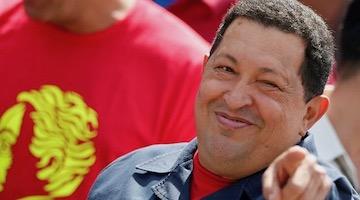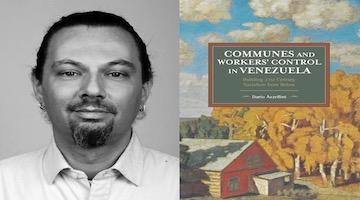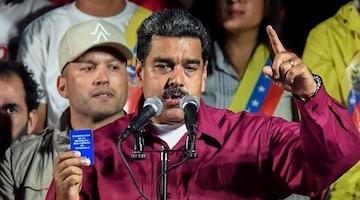“Chávez created this philosophy, which is anti-imperialist and also humanist.”
Attendees to the Second Anti-imperialist Forum in Defense of the Motherland, held in Caracas, were able to see an unusual sight for Latin America. As they entered the Teresa Carreño Theater they were received by hundreds of militaries of the three forces, wearing their uniforms. Because in Venezuela, unlike other countries in the continent, it is not the state and the military who practice colonization and terrorism, but the opposition forces.
At the forum, many expert speakers discussed tactics of asymmetric and unconventional war, the role of media in confronting destabilizing campaigns, and the need to unite the defense of human rights to the struggle against imperialism.
Before Chávez, the national military was not a unified force—each of the three arms was a separate entity, and the right-wing government kept it as such to prevent them from colluding, according to the first speaker of the forum, Minister of Communication Ernesto Villegas. “Clearly, they needed to divide the military in order to divide the nation,” he added. When Chávez arrived in government, he put an end to this situation, and the armed forces became a single body.
The Minister considers that “war and politics are matters of communication. Furthermore: we are all communicators.” To him, “in order to win the war that has been declared against us by our enemies, we have the military, we have the people, and we have international solidarity. But if we don’t achieve victory in the field of communication, there won’t be a political victory.”
“We have the military, we have the people, and we have international solidarity.”
It was then turn for the Minister of Defense, Vladimir Padrino López, one of the most respected leaders of the Chavista people. He recalled that “Chávez created this philosophy, which is anti-imperialist and also humanist.”
In a quick review of the nefarious history of Latin American military and their relations of submission to the United States, Padrino spoke of the dictatorships that changed the destiny of the continent, in accordance to the Condor Plan, and other tactics used to destroy revolutionary and progressivist movements.
He noted that the strategy that is currently being implemented at a global level is the “doctrine of smart power,” which is a combination of “hard power” and “soft power” tactics implemented in the framework of international relations. Defense, he said, is not an issue that only concerns the military, but also many actors of the political and social arena. He also emphasized that there are no elites in the Venezuelan military [FANB], as there were during the neoliberal Fourth Republic. He also called to “strengthen the military apparatus, reaffirm the civic-military unity and encourage the participation of the people in defense of the nation.”
“There are no elites in the Venezuelan military, as there were during the neoliberal Fourth Republic.”
A particularly emotional moment was the homage given by Padrino López to the men and women of the Bolivarian National Guard (BNG) who risked their lives in defense of the population during the hardest times of the latest onslaught of the opposition. “The FANB and the BNG exercised patience, civility and intelligence in these months of struggle against terrorism,” he said.
Lastly, the Chief of the Strategic Operations Command of the FANB, Almirall Remigio Ceballos, affirmed that the Anti-imperialist forum will allow the awakening of the consciousness of the people.
“The forum will allow us the enter the international context to prepare the people for the defense of the nation”, he sentenced.
He insisted that consciousness is the most powerful weapon to resist the attacks of imperialism.
All of the speakers agreed that the ordinary people of Venezuela are an indispensable element for victory, and thanked the international manifestations of solidarity with Venezuela, which are vital for the life of the Revolution.
This article previously appeared in The Dawn News.













